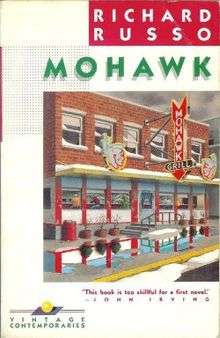Mohawk (novel)
 First edition cover with quote by John Irving | |
| Author | Richard Russo |
|---|---|
| Country | United States |
| Language | English |
| Publisher | Vintage Books |
Publication date | 1986 |
| Media type | Print (hardback & paperback) |
| Pages | 418 pp |
| ISBN | 0-394-74409-8 |
| OCLC | 46946938 |
| 813/.54 21 | |
| LC Class | PS3568.U812 M6 2001 |
Published in 1986, Mohawk is the debut novel by American author Richard Russo - who went on to win a Pulitzer Prize.
Plot introduction
Set in Mohawk, an upstate New York mill town in decline along with its leather tanning industry. The novel is centered on the Mohawk Grill, a diner run by Harry Saunders and charts the lives two intersecting families, the Grouses and the Gaffneys. Anne Grouse is the 40-year-old daughter of Mather Grouse and lives with her parents and son Randall after her divorce from Dallas Younger her high-school sweetheart, a good-hearted but unreliable auto-mechanic. Anne is in love with her cousin Diana's husband Dan who is paralysed after a car accident. The relationship between Mather and fellow leather-worker Rory Gaffney provides suspense to the story and Randall befriends Rory's mentally disabled son Bill, who is in love with Mather's daughter Anne. Following Mather's death, Randall returns to Mohawk having dropped out of college to avoid the draft and meets Rory's granddaughter B.G who falls in love with him. The story climaxes with Randall being accused of murder as three Gaffneys lay dead.
Reception
- Greg Johnson in The New York Times writes, "Despite its byzantine plot, the novel delineates good and evil along simplistic lines. . . . There's an attractive, small-town coziness to much of the story, though . . . The writing, moreover, is brisk, colorful and often witty. These qualities and the impressive scope of the novel bode well for Richard Russo's future, but the initially strong sympathy he evokes for his characters is gradually lost in the complex windings of plot and structure."[1]
- Kirkus reviews concludes "Workmanlike writing for lovers of the well-atmosphered small-town saga with not a cliche unturned. For those idle hours between daytime soaps."[2]
References
- ↑ 'In Short: Fiction', New York Times, Oct 12 1986 Retrieved 2015-09-20,
- ↑ Soapy first novel Retrieved 2015-09-20.